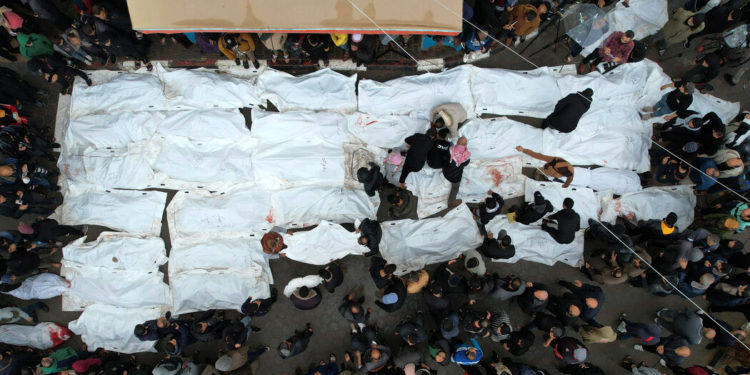By THE NEW YORK TIMES
The Israeli military said on Thursday that it had caused “unintended harm” to “uninvolved civilians” in two strikes this week on a densely packed Gaza Strip neighborhood, where, the local health authorities said, dozens were killed.
It was a rare admission of fault by the military over its conduct of the war. The military said it was targeting Hamas on Sunday when it launched two strikes on the central Gazan community of Al Maghazi, which has been flooded with Palestinians uprooted by war and crammed into homes by the dozen.
“A preliminary investigation revealed that additional buildings located near the targets were also hit during the strikes, which likely caused unintended harm to additional uninvolved civilians,” the Israel Defense Forces said in a statement.
“The I.D.F. regrets the harm to uninvolved individuals, and is working to draw lessons from the incident,” the statement said.
Israel has come under growing international pressure to scale back its heavy air and ground campaign in Gaza, where more than 20,000 people have been reported killed, after a Hamas-led attack on Israel on Oct. 7.
Much of the criticism has been not just about the extent of the bombing, but also about the weapons being used, including U.S.-provided 2,000-pound bombs that many military experts say are unsuitable for densely populated areas. After the strike in Al Maghazi, photos showed a gray concrete building gaping with dark holes where rooms used to be, and a mound of debris where men appeared to be digging for survivors, or bodies.
An unidentified military official told Kan News, Israel’s public broadcaster, that an improper choice of weaponry was to blame for the extensive damage and high civilian death toll, adding that the type of munition used did not match the nature of the attack.
The military’s statement on Al Maghazi came as excerpts from a leaked draft of an Israeli Supreme Court ruling on legislation passed by Prime Minister Benjamin Netanyahu’s initial coalition administration and his far-right allies to rein in the power of Israeli’s judiciary threatened to rattle his alliance with some of his opponents.
An Israeli broadcaster, Channel 12, reported on Wednesday night that, in a draft decision, a one-vote majority of justices favored striking down an amendment to a basic law that would prevent judges from overturning government decisions and appointments on the grounds that they are unreasonable, part of a wider judicial overhaul that divided the country.
The New York Times has not obtained a copy of the document, and Channel 12 did not publish it in full.
On Thursday, a spokeswoman for Israel’s courts said that “the writing of the ruling is not yet complete.” The court was expected to rule by mid-January, the legal deadline for two retiring justices to file their decisions.
In the months before the war, Mr. Netanyahu’s drive to reduce the authority of the judiciary brought the country to the brink of political paralysis. Now, the prospect that the court might overturn a law directly limiting its own authority has resurrected the specter of a constitutional crisis in a country engaged in its biggest war in decades.
The re-emergence of the judiciary issue also threatens to chip away at the striking unity that has characterized the ordinarily fractious country since Hamas-led forces from the Gaza Strip struck southern Israel on Oct. 7, killing an estimated 1,200 people and plunging the country in war.
The Israeli justice minister, Yariv Levin, who is widely seen as a key architect of the judicial overhaul, on Thursday cited the campaign against Hamas as another reason for the court to stay out of the fight over the judiciary. The Israeli public, he argued, must not be “torn apart by disputes” at a time when soldiers are “fighting side by side on the various fronts, and while the entire nation is grieving the loss of many lives.”
In pushing for the judicial overhaul, Mr. Netanyahu’s and his allies said they were working to curb what they described as the court’s ability to overrule the will of the majority. Critics said they were undermining the separation of powers.
Israelis opposed to the changes — including many reserve soldiers in the armed forces — at times brought Israel to a near standstill before the Hamas attack.
The critics also included two prominent Israelis who are now in the war cabinet: Benny Gantz, a longtime rival of Mr. Netanyahu’s; and Defense Minister Yoav Gallant, who warned that the political crisis was emboldening Israel’s enemies. Mr. Netanyahu had tried to fire Mr. Gallant after he called for a pause in enacting the overhaul, only to reverse the decision amid mass protests.
Mr. Gantz’s partnership with Mr. Netanyahu and his allies has been tenuous from the start, marked by divisions and mistrust, political analysts say, and it might not survive an added crisis.
The renewed political turmoil in Israel came as it pursued its goal of destroying Hamas in Gaza. But as in Al Maghazi, civilians were paying a heavy toll.
On Wednesday and Thursday, the Palestinian Red Crescent Society said, Israeli airstrikes killed more than 40 people near a hospital that the society operates in southern Gaza, one of the last functioning medical facilities in the enclave. Most of those killed around Al-Amal Hospital in Khan Younis were displaced people seeking shelter, said Nebal Farsakh, a spokeswoman for the organization.
Also on Thursday, the Israeli military released a summary of its investigation into the mistaken killing of three Israeli hostages in Gaza on Dec. 15. The deaths shocked the Israeli public and raised broader questions about how Israeli forces have conducted themselves in Gaza.
The summary offered harrowing new details about the killings. When the last of the three hostages cried, “Help” in Hebrew, it reported, the battalion commander called out for him to step forward and ordered his troops to hold fire.
“Two soldiers, who did not hear the order due to noise from a nearby tank, shot at and killed the third hostage,” the military said.
With approximately 130 hostages seized on Oct. 7 still being held in Gaza, the military said it was distributing the photos of the remaining hostages to troops, in an attempt to avoid similar mistakes going forward.
Israelis also learned on Thursday that a woman believed to be a hostage in Gaza had, in fact, been killed in the initial Hamas attack. The woman, Judih Weinstein Haggai, 70, died on Oct. 7, her family and Kibbutz Nir Oz said in statements on Thursday. Ms. Haggai’s husband, Gadi Haggai, had also been listed as a hostage, but last week it was announced that he, too, was killed that day.
Patrick Kingsley, Anushka Patil and Raja Abdulrahim contributed reporting.







Discussion about this post